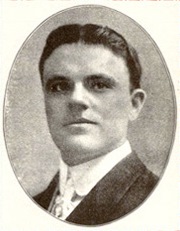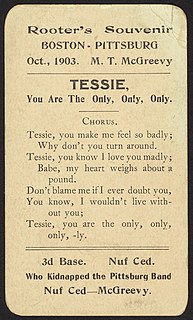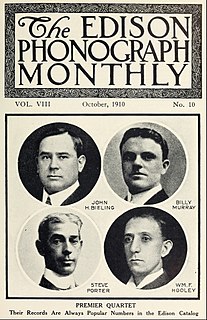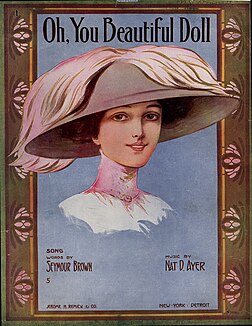Related Research Articles
This is a list of notable events in music that took place in the year 1909.
The Haydn Quartet, later known as the Hayden Quartet, was one of the most popular recording close harmony quartets in the early twentieth century. It was originally formed in 1896 as the Edison Quartet to record for Edison Records; it took its new name when recording for other companies. The name was a homage to Joseph Haydn, the classical composer; the spelling was later revised to Hayden, which reflects the way it was pronounced. The group disbanded in 1914.

Garfield: The Movie is a 2004 American live action/computer-animated comedy film. It is the first installment in the Garfield film duology and is about the titular overweight, lazy, trouble-making cat with a dry sense of humor. Directed by Peter Hewitt and inspired by Jim Davis' comic strip of the same name, it stars Breckin Meyer as Jon Arbuckle, Jennifer Love Hewitt as Dr. Liz Wilson and features Bill Murray as the voice of Garfield, who was created with computer animation, though all other animals were real. The film was produced by Davis Entertainment Company and 20th Century Fox. It was released in the United States on June 11, 2004. The film received negative reviews from critics and grossed $200 million on a $50 million budget. A sequel, Garfield: A Tail of Two Kitties, was released in 2006. It is the first Garfield film distributed by 20th Century Fox following their acquisition of the license, which would expire in 2009.

William Thomas Murray was one of the most popular singers in the United States in the early 20th century. While he received star billing in vaudeville, he was best known for his prolific work in the recording studio, making records for almost every record label of the era.
Are Ye Right There Michael is a song by the 19th-century and early 20th-century Irish composer and musician Percy French, parodying the state of the West Clare Railway system in rural County Clare. It was inspired by an actual train journey in 1896. Because of a slow train and the decision of the driver to stop for no apparent reason, French, though having left Sligo in the early morning, arrived so late for an 8pm recital that the audience had left. The ballad caused considerable embarrassment for the railway company, which was mocked in music halls throughout Ireland and Britain because of the song. It led to an unsuccessful libel action against French.

"Tessie" is both the longtime anthem of the Boston Red Sox and a 2004 song by the punk rock group Dropkick Murphys. The original "Tessie" was from the 1902 Broadway musical The Silver Slipper. The newer song, written in 2004, recounts how the singing of the original "Tessie" by the Royal Rooters fan club helped the Boston Americans win the first World Series in 1903. The name Tessie itself is a diminutive form used with several names, including Esther, Tess, and Theresa/Teresa.
Kidsongs is an American children's media franchise that includes Kidsongs Music Video Stories on DVD and video, The Kidsongs TV Show, CDs of favorite children's songs, song books, sheet music, toys and an ecommerce website. It was created by producer/writer Carol Rosenstein and director Bruce Gowers of Together Again Video Productions (TAVP), both of whom are music video and television production veterans. The duo had produced and directed over 100 music videos for Warner Bros. Records (WBR) and took their idea of music videos for children to the record label. Warner Brothers funded the first video, "A Day at Old MacDonald's Farm". Shortly thereafter, a three-way partnership between TAVP, WBR and View-Master Video was formed with TAVP being responsible for production and WBR and View-Master responsible for distribution to video and music stores, and toy stores respectively.

"It's a Long Way to Tipperary" is an Irish music hall song first performed in 1912 by Jack Judge, and written by Judge and Harry Williams, though authorship of the song has long been disputed.
The game of cricket has inspired much poetry, most of which romanticises the sport and its culture.

Joshua Otis Turner is an American country and gospel singer and songwriter. In 2003, he signed to MCA Nashville Records. That same year, his debut album's title track, "Long Black Train", was his breakthrough single release. His second album, Your Man (2006) accounted for his first two number-one hits: "Your Man" and "Would You Go with Me", while 2007's Everything Is Fine included a No. 2 in "Firecracker". Haywire, released in 2010, produced his biggest hit, the four week No. 1 "Why Don't We Just Dance" and another number one in "All Over Me". It was followed by Punching Bag (2012), whose lead-off single "Time Is Love" was the biggest country hit of 2012 according to Billboard Year-End.

Dayenu is a song that is part of the Jewish holiday of Passover. The word "dayenu" means approximately "it would have been enough", "it would have been sufficient", or "it would have sufficed". This traditional up-beat Passover song is over one thousand years old. The earliest full text of the song occurs in the first medieval haggadah, which is part of the ninth-century Seder Rav Amram. The song is about being grateful to God for all of the gifts given to the Jewish people, such as taking them out of slavery, giving them the Torah and Shabbat, and had God only given one of the gifts, it would have still been enough. This is to show much greater appreciation for all of them as a whole. The song appears in the haggadah after the telling of the story of the exodus and just before the explanation of Passover, matzah, and the maror.
"Pretty Baby" is a song written by Tony Jackson during the Ragtime era. The song was remembered as being prominent in Jackson's repertory before he left New Orleans in 1912, but was not published until 1916.

James William McCarty is an American blues rock guitarist from Detroit, Michigan. He has performed with Mitch Ryder and The Detroit Wheels, the Buddy Miles Express, Cactus, The Rockets, the Detroit Blues Band, and more recently, Mystery Train. Since about 2014 Jim McCarty has joined forces with Detroit blues guitarist/songwriter Kenny Parker in The Kenny Parker Band along with several other veteran Detroit blues/rock musicians. He also makes guest appearances with other Detroit bands, most notably for an annual pre New Year's Eve party at one of his favorite clubs, "Callahan's", with The Millionaires, a nine piece jump blues band.

The American Quartet was a four-member vocal group that recorded for various companies in the United States between 1899 and 1925. The membership varied over the years, but the most famous line-up — comprising John Bieling, Billy Murray, Steve Porter (baritone), and William F. Hooley (bass) — recorded for the Victor Talking Machine Company from 1909 to 1913. The same group of singers also recorded for Edison Records as the Premier Quartet, and for that and other labels as the Premier American Quartet. From 1912 to 1914 the quartet also recorded with countertenor Will Oakland as the Heidelberg Quintet.

Aimee Mayo is a Grammy-nominated songwriter and author. Her songs have spent twenty-six weeks in the #1 spot on the Billboard charts, and albums featuring her songs have sold over 155 million units worldwide. She is primarily known for writing hits for artists such as Taylor Swift, Tim Mcgraw, Lonestar, Meghan Trainer The Civil Wars, Backstreet Boys, Adam Lambert Kenny Chesney, Carrie Underwood Martina McBride, Sara Evans, Faith Hill, Blake Shelton, Boyz II Men, Brad Paisley, Billy Currington, Kellie Pickler and more. Mayo is one of the few females to receive both BMI's Country Song of the Year and Songwriter of the Year awards, putting her in the rare company of Dolly Parton and Taylor Swift. Mayo was also a judge on the CMT series, Can You Duet. In 2020, Mayo released a memoir titled Talking to the Sky.

"Oh, You Beautiful Doll" is a ragtime love song published in 1911 with words by Seymour Brown and music by Nat D. Ayer. The song was one of the first with a twelve-bar opening.
The following is a list of albums released with songs from or based on the animated series VeggieTales.
On the Old Fall River Line is a song composed in 1913 by William Jerome (words), Andrew B. Sterling (words) and Harry Von Tilzer (music) set on a steamship of the Fall River Line of steamships between New York and Newport, Rhode Island, which connected with trains from Newport to Boston. Von Tilzer had often traveled the line and was inspired by honeymooners "stirred to romantic depths by the alliance of shadowy darkness, twinkling stars, softly lapping waves and stately moving ships." Popular during World War I, especially among New England soldiers, it was also "much parodied." It is a cheerful, up-tempo ditty, but, typically of its time, "there is a final twist to married bliss with the final chorus line of: 'But I wish "oh Lord" I fell overboard, On the old Fall River Line.'" Described by the New York Times as "a popular song of a quarter century ago" in 1937, its full chorus was used that same year in Time Magazine's article on the passing of the old steamboat line. Although still garnering a place in Billboard's 1949 listing of "Harry Von Tilzer's Best Known Songs" as late as 1949 and being described as "a famous verse" by The Christian Science Monitor in 1950, a dozen years after the last ship had sailed, it is less remembered today, although not completely forgotten. Modern-day performers have included Steve Martin and Tiny Tim.

John H. Bieling was an American tenor singer who was a pioneer recording artist in the early years of the twentieth century. He featured on thousands of recordings, especially as a member of The Haydn Quartet and The American Quartet, two of the most popular vocal groups of the period.
References
- ↑ Billboard. Nielsen Business Media, Inc. 1949-10-22. p. 76.
- ↑ "On the 5.15". Library of Congress. Retrieved 2021-08-06.
- ↑ Neibaur, James L. (2014-10-03). James Cagney Films of the 1930s. Rowman & Littlefield. p. 12. ISBN 978-1-4422-4220-3.